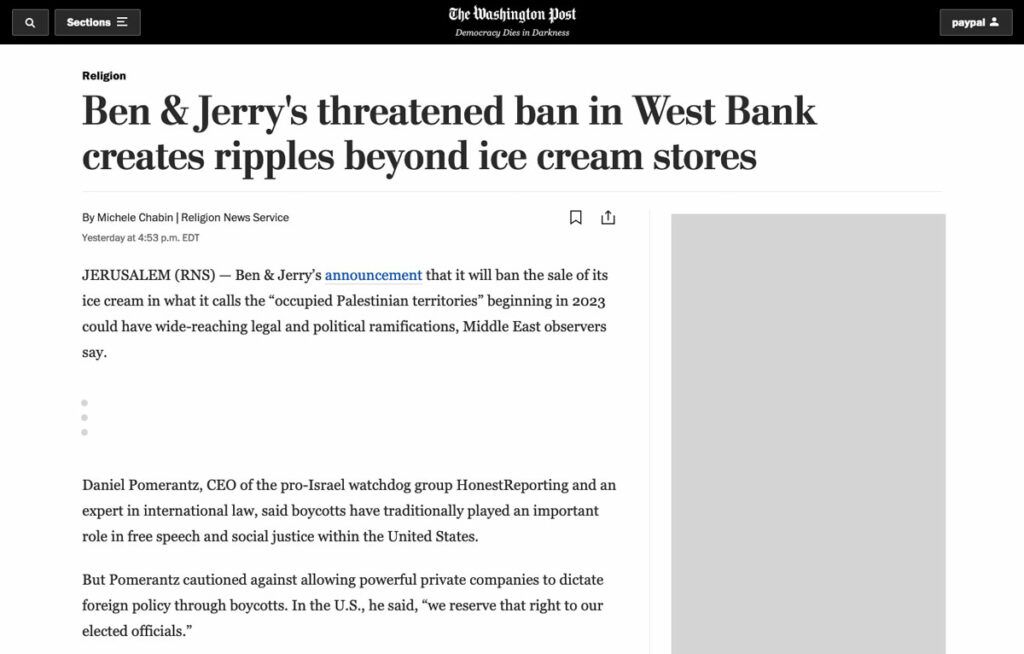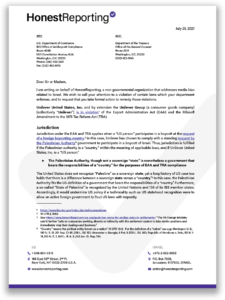On July 19, 2021, the Ben & Jerry’s ice cream brand, a wholly-owned subsidiary of the Unilever Group, announced:
We believe it is inconsistent with our values for Ben & Jerry’s ice cream to be sold in the Occupied Palestinian Territory (OPT)…We have informed our licensee that we will not renew the [Israeli] license agreement when it expires at the end of next year.”
The announcement led to spirited discussions about whether the decision is discriminatory or even antisemitic. Yet, Western media coverage has neglected one critical fact: it’s also illegal. In a July 20 article in The Washington Post, Daniel Pomerantz, HonestReporting CEO and an expert in international law, said that boycotts have traditionally played an important role in free speech and social justice within the United States.
However, he cautioned against allowing private companies to dictate foreign policy through boycotts.
In the US, Pomerantz said, “we reserve that right to our elected officials.”
The United States Constitution, as well as numerous acts of Congress and various state laws, prohibit American individuals and corporations from participating in boycotts against foreign countries. In short, a private boycott against a foreign government is not “free speech” like the domestic boycotts of the Civil Rights Movement, but rather a tool of statecraft that, like war, is reserved to the federal government alone. This is an issue Pomerantz recently explored in depth.
In response to Ben & Jerry’s decision, lawmakers in five US states are now examining whether the ice cream company’s move to stop selling in Jewish communities in the West bank breached legislation that was passed to combat the Boycott, Divestment and Sanctions movement targeting the Jewish state. There are at least 34 states that must stop doing business with companies that boycott Israel — and 21 of those explicitly include West Bank “settlement” boycotts in their definitions.
Moreover, there are also federal laws against boycotts, including clauses of the Constitution itself, and that is where HonestReporting is taking action.
Join the fight for Israel’s fair coverage in the news
Ben & Jerry’s: Selling Ice Cream While Communicating to Millions
In this online age, companies don’t just sell products, they also communicate with their millions of customers through online platforms. When such a company communicates a political message, the customers hear it. When that message relates to a topic on which the company has credibility, many will believe it.
In this case, Ben & Jerry’s has 8.6 million followers on Facebook and nearly 525,000 followers on Twitter. And the Vermont-based company’s global reach isn’t just virtual. Ben & Jerry’s is the world’s fourth top-selling ice cream brand, it operates in approximately 39 countries, and runs over 200 dairy farms. According to one estimate, 3.34 million Americans consumed four or more quarts in 2020.
As such, Ben & Jerry’s enjoys significant credibility and its influence extends to the public discourse on such hot-topic issues as the environment, racial justice and refugee rights. And Ben & Jerry’s has fans across the political spectrum, so when it announces a plan to ban the sale of its ice cream in what it calls the “occupied Palestinian territories,” millions of people are listening.
HonestReporting Formulates Legal Response
In response to Ben & Jerry’s boycott, Israel warned the Unilever Group that it was considering a legal response. In addition, US State Department spokesperson Ned Price repeated the US government’s line against the Boycott, Divestment and Sanctions (BDS) movement that “unfairly singles out” Israel.
Ben & Jerry’s decision represents shameful surrender to antisemitism, to BDS and to all that is wrong with the anti-Israel and anti-Jewish discourse.
We will not be silent.— יאיר לפיד – Yair Lapid🟠 (@yairlapid) July 19, 2021
We at HonestReporting are no strangers to taking legal action when appropriate. For example, in 2018 we responded swiftly to Airbnb, Inc’s announcement that the popular online hospitality service planned to “remove listings in Israeli settlements in the occupied West Bank that are at the core of the dispute between Israelis and Palestinians.” In 2012, we launched legal proceedings and successfully forced The Guardian to reverse its policy of claiming that Tel Aviv is the capital of Israel.
And now we are launching proceedings once again: this time via the United States Office of Antiboycott Compliance (the “OAC”) that enforces America’s numerous antiboycott laws.
If found to be in violation of the relevant laws, Unilever, United States, Inc. could be subject to significant fines, tax consequences or even criminal action. Through its illegal acts, the consumer goods giant is even risking its ability to continue doing business in the United States.
To see our complaint to the OAC, click HERE.
And watch this space for further updates on HonestReporting’s action against Ben & Jerry’s discriminatory and illegal policy toward Israel.
Liked this article? Follow HonestReporting on Twitter, Facebook, Instagram and TikTok to see even more posts and videos debunking news bias and smears, as well as other content explaining what’s really going on in Israel and the region.




